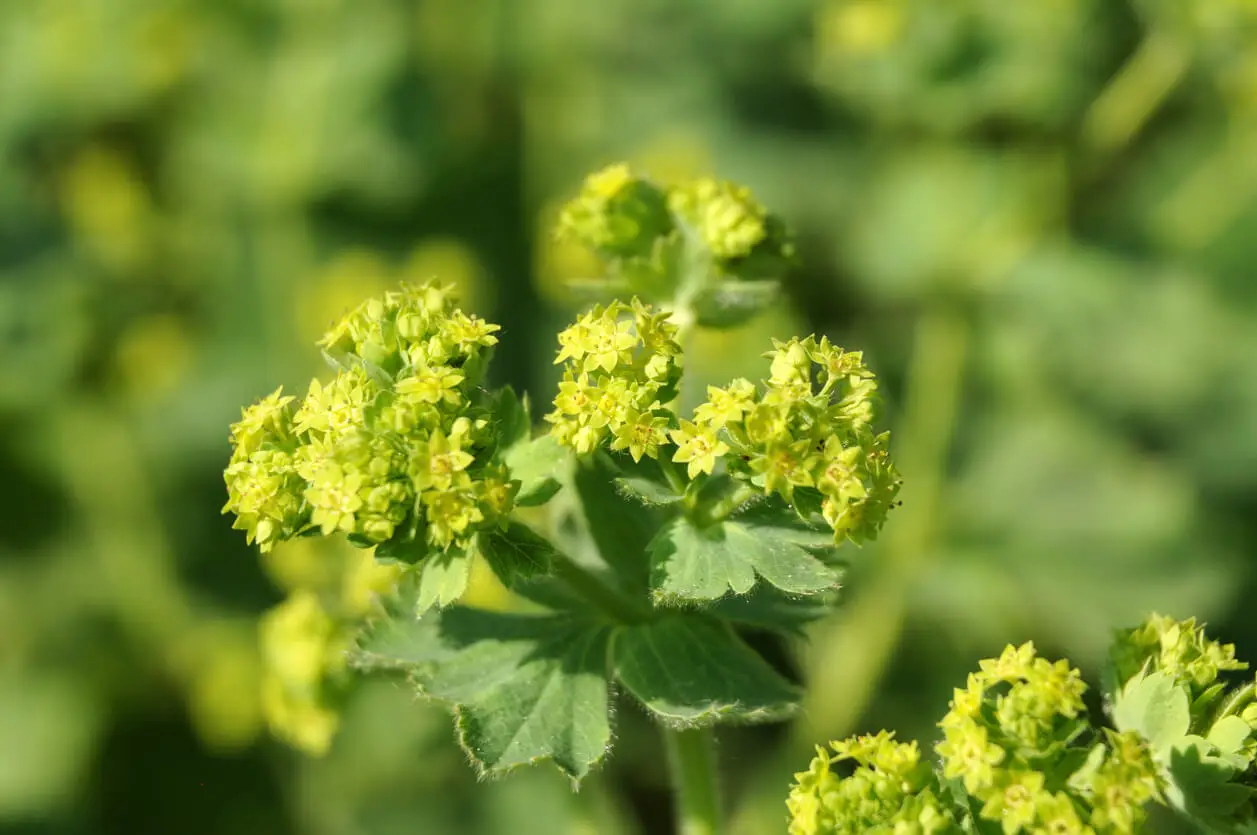Alchemilla: Does It Help to Relieve Menstruation Symptoms?


Reviewed and approved by the pharmacist Franciele Rohor de Souza
Alchemilla, scientific name Alchemilla vulgaris, is a phanerogamous plant that belongs to the Rosaceae family. It has a size between 10 and 40 centimeters (4 to 16 inches), with a woody rhizome, an erect stem with branches, on which you can see rounded leaves and small flowers in yellowish-green tones. Find out if it can be useful to treat menstruation symptoms.
Although it’s native to Europe, its cultivation extends to some regions of Asia and North America. It’s also called “lion’s foot” and is known in natural medicine for its potential to treat ailments associated with women’s health. In particular, it is used against the symptoms of menstruation and menopause.
According to the iNaturalist project of the California Academy of Sciences and the National Geographic Society, it is useful for dysmenorrhea and leucorrhea. It also has astringent qualities. Want to know more about it? We’ll tell you what science says about its applications in menstrual health.
Alchemilla: can it calm menstruation symptoms?
Traditionally, alchemilla has been used as a supplement to improve women’s reproductive and hormonal health. As compiled by research shared in the scientific journal RSC Advances, it has a history as an adjuvant for conditions such as the following:
- Cysts
- Fibroids
- Infertility
- Endometriosis
- Menstrual problems and altered menstrual cycles
- Alteration of reproductive and thyroid hormones
Now, this isn’t to say that there’s complete certainty regarding such benefits. It should be noted that studies are still ongoing and there still isn’t enough clinical evidence to prove its efficacy.
For now, it shouldn’t be considered a first-choice treatment.

Another useful article for you: 5 Remedies to Regulate Your Period
First of all, it’s worth noting that studies have been able to corroborate the abundant phenolic compound content of alchemilla. A phytochemical analysis and an in vitro examination of the plant – disclosed in the South African Journal of Botany – reported that methanolic extracts of the aerial parts and roots of Alchemilla vulgaris concentrate gallic and ellagic tannins.
These substances, in particular, provide antioxidant, anti-inflammatory and astringent properties, with the potential to favor the relief of some ailments and diseases. As far as menstruation is concerned, evidence suggests that it has the potential to soothe dysmenorrhea (menstrual pain).
In particular, the hypothesis is that it helps regulate the production of prostaglandins, whose increase is associated with the inflammation and pain that occur during the period. However, the researchers stress the need for further in vitro and human studies to corroborate these properties.
However, popular literature mentions that the plant’s astringent properties are useful in controlling heavy menstrual bleeding (menorrhagia). A disclosure in The Journal of the Canadian Chiropractic Association includes this plant in the list of beneficial supplements against this condition.
Despite this, no concrete studies have been carried out to evaluate this use. More scientific evidence is needed to qualify its effectiveness when applied for this purpose.
For other uses, evidence is also insufficient
Given its abundant flavonoid and tannin content, alchemilla is linked to other health benefits. However, the scientific evidence is currently insufficient. This includes the following:
- Diarrhea
- Diabetes
- Wound healing
- Arterial hypertension
- Stomach disorders
- Muscle spasms
- Skin conditions such as ulcers, eczema and rashes
Contraindications and possible interactions of alchemilla
Alchemilla supplements are possibly safe for most healthy adults. Of course, it is necessary to follow the manufacturer’s dosage recommendations. Exceeding the recommended dosage may lead to liver damage.
In addition, due to lack of evidence, its use is discouraged in the following cases:
- Young children
- Pregnancy and lactation
- Patients with kidney or liver diseases
The safety profile of alchemilla on the skin is not known. Caution is advised when using it topically.
The plant may lead to interactions when taken concurrently with certain drugs. Its abundant tannin content may reduce the effectiveness of drugs taken orally.
In the case of medical treatment, you will need to consult with a specialist before taking the supplements. It isn’t recommended to take it in conjunction with drugs for diabetes and blood pressure.

How to prepare an infusion of alchemilla?
In health food stores it’s possible to purchase alchemilla supplements in different presentations, such as tea bags, tablets, and tinctures for external use. Each one has its own recommendations, established by the manufacturer.
One of the most common forms of use is by infusion. To do this, a tea bag is taken, or 1 tablespoon (15 grams) of the dried plant is used. Just add the herb to hot water and let it stand for 10 minutes. Then strain it and consume it.
In the case of menstruation, it is suggested to start its use two days before the onset of bleeding.
Read more here: 13 Herbal Teas to Prevent or Treat Menstrual Cramps
So, does alchemilla help with menstruation symptoms?
The phenolic compounds contained in alchemilla have been associated with positive effects on women’s hormonal and reproductive health. Although the evidence is insufficient, it is said to act as an anti-inflammatory, astringent and antispasmodic. Therefore, it may help to calm dysmenorrhea.
It may help in cases of menorrhagia, but there’s no conclusive evidence. However, you must be aware that it isn’t a first-line treatment. If there are changes in menstruation that don’t improve, it’s best to consult a gynecologist.
All cited sources were thoroughly reviewed by our team to ensure their quality, reliability, currency, and validity. The bibliography of this article was considered reliable and of academic or scientific accuracy.
- Alchemilla vulgaris. (n.d.). iNaturalist. California Academy of Sciences. National Geographic Society. Available in https://ecuador.inaturalist.org/taxa/56054-Alchemilla-vulgaris
- Tadic, Vanja & Krgović, Nemanja & Žugić, Ana. (2020). Lady’s mantle (Alchemilla vulgaris L., Rosaceae): A review of traditional uses, phytochemical profile, and biological properties. Lekovite sirovine. 66-74. 10.5937/leksir2040066T.
-
Boroja, T., Mihailović, V., Katanić, J., Pan, S.-P., Nikles, S., Imbimbo, P., Monti, D. M., Stanković, N., Stanković, M. S., & Bauer, R. (2018). The biological activities of roots and aerial parts of Alchemilla vulgaris L. In South African Journal of Botany (Vol. 116, pp. 175–184). Elsevier BV. https://doi.org/10.1016/j.sajb.2018.03.007
- Livdans-Forret AB, Harvey PJ, Larkin-Thier SM. Menorrhagia: a synopsis of management focusing on herbal and nutritional supplements, and chiropractic. J Can Chiropr Assoc. 2007 Dec;51(4):235-46. PMID: 18060009; PMCID: PMC2077876.
- Tasić-Kostov M, Arsić I, Pavlović D, Stojanović S, Najman S, Naumović S, Tadić V. Towards a modern approach to traditional use: in vitro and in vivo evaluation of Alchemilla vulgaris L. gel wound healing potential. J Ethnopharmacol. 2019 Jun 28;238:111789. doi: 10.1016/j.jep.2019.03.016. Epub 2019 Mar 21. PMID: 30904703.
- Takır S, Altun IH, Sezgi B, Süzgeç-Selçuk S, Mat A, Uydeş-Doǧan BS. Vasorelaxant and blood pressure lowering effects of alchemilla vulgaris: A comparative study of methanol and aqueous extracts. Pharmacogn Mag. 2015 Jan-Mar;11(41):163-9. doi: 10.4103/0973-1296.149733. PMID: 25709228; PMCID: PMC4329619.
This text is provided for informational purposes only and does not replace consultation with a professional. If in doubt, consult your specialist.








